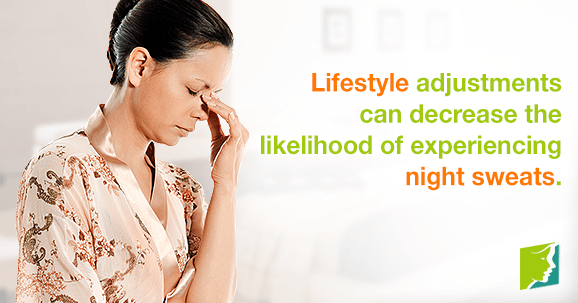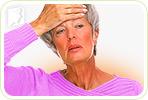Night sweats are most commonly associated with menopausal women. However, many people experience night sweats, not just those going through menopause. Night sweats have a range of triggers, including exercising at night, sleeping with too many blankets, anxiety, or an underlying medical condition. Night sweats can be uncomfortable and prevent a person from getting a good night's sleep. Night sweats may also have a cyclical connection in women, because they are often related to a woman's menstrual cycle.
Many people who experience night sweats wake up in the middle of the night drenched in sweat and with their sheets also soaking from perspiration. Along with excessive perspiration, night sweats can cause or include:
- Insomnia or disrupted sleep
- Irregular heartbeat
- Chills after having a night sweat
Night Sweats and Menstrual Cycle: The Relationship
The connection may be because night sweats are correlated to decreased levels of sex hormones in women. This is part of the reason why many menopausal women experience night sweats - menopause causes sex hormone levels to decrease. However, women who menstruate regularly experience a cycle of monthly hormone changes. When sex hormones, estrogen and progesterone, are at their lowest each month, a woman may be more likely to experience night sweats. Decreased estrogen levels may cause night sweats and hot flashes because estrogen plays a role in sending signals to the part of the brain that controls body temperature.
Night sweats can be difficult to predict, and it can be difficult to see exactly what is triggering your night sweats. It may be a good idea to keep a journal where you can keep track of when you get night sweats. By including exercise habits, dietary habits, moods, and other medical symptoms you are experiencing, you can help pinpoint what is triggering your night sweats. Then you can treat these underlying causes to help decrease the severity and frequency of night sweats. Common triggers of night sweats include:
- Spicy and hot foods
- Alcohol and caffeine
- Tight-fitting or restrictive clothing
- Exercising before bed
- Using a sauna or hot tub
Managing Night Sweat Episodes
There are also some lifestyle adjustments you can make to decrease the likelihood of experiencing night sweats. These include:
- Eating a healthy diet rich in fruits, vegetables, lean protein, dairy products, and fiber
- Exercising regularly and limiting working out before bed
- Using less blankets or a thinner comforter
- Wearing lightweight pajamas made of breathable fibers
If your night sweats continue and they are disrupting your life and well-being, it is important to see a doctor, especially if you have other symptoms. Night sweats can also be a symptom of underlying medical conditions that are serious. Click on the following link for more information on treating night sweats.
Sources
- Clancy, K. (2012). Don t Sweat It: Premenopausal Women, Reproductive State, and the Joy of Night Sweats. Retrieved October 5, 2015, from http://blogs.scientificamerican.com/context-and-variation/dont-sweat-it-premenopausal-women-reproductive-state-and-the-joy-of-night-sweats/
- Mayo Clinic Staff. (2014). Night Sweats. Retrieved October 5, 2015, from http://www.mayoclinic.org/symptoms/night-sweats/basics/causes/sym-20050768




